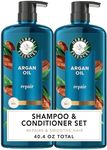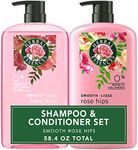Buying Guide for the Best Shampoos And Conditioners
Choosing the right shampoo and conditioner can make a big difference in the health and appearance of your hair. The best products for you depend on your hair type, scalp condition, and any specific concerns you want to address, such as dryness, oiliness, or color protection. It's important to understand what each product offers and how it matches your personal needs, rather than just picking the most popular or expensive option.Hair Type CompatibilityThis refers to whether a shampoo or conditioner is formulated for a specific hair type, such as straight, wavy, curly, or coily hair. It's important because different hair types have unique needs; for example, curly hair often requires more moisture, while fine hair may need lightweight formulas. Products are usually labeled for their intended hair type, so start by identifying your own hair type and look for products that match. If you're unsure, observe how your hair behaves naturally and choose accordingly.
Scalp ConditionScalp condition means whether your scalp is oily, dry, sensitive, or balanced. This is important because a healthy scalp is the foundation for healthy hair. Shampoos for oily scalps help control excess oil, while those for dry scalps provide extra hydration. If you have dandruff or sensitivity, look for gentle or medicated formulas. Assess your scalp by noticing if it feels tight, itchy, flaky, or greasy, and select products that address those specific issues.
Moisturizing and HydrationThis spec indicates how much moisture a shampoo or conditioner provides. It's crucial for people with dry, damaged, or curly hair, as these types often need extra hydration to stay healthy and manageable. Moisturizing products are usually labeled as 'hydrating' or 'nourishing.' If your hair feels dry, brittle, or frizzy, opt for these. If your hair is fine or gets oily quickly, choose lighter, volumizing formulas instead.
Sulfate and Paraben ContentSulfates and parabens are common ingredients in hair products, but some people prefer to avoid them due to concerns about irritation or long-term effects. Sulfates help create lather but can strip natural oils, making them less suitable for dry or color-treated hair. Paraben-free products are often chosen by those with sensitive skin or who want a more natural approach. If you have sensitive skin, color-treated hair, or prefer gentle products, look for sulfate-free and paraben-free options.
Color ProtectionColor protection refers to whether a product is designed to help maintain dyed or highlighted hair. These formulas are important because they help prevent color fading and keep hair looking vibrant. If you color your hair, look for shampoos and conditioners labeled as 'color-safe' or 'color-protecting.' If your hair is natural and uncolored, this feature is less important for you.
Repair and StrengtheningSome shampoos and conditioners are formulated to repair damage and strengthen hair, often containing proteins or keratin. This is important for people with damaged, brittle, or chemically treated hair. If your hair breaks easily, feels weak, or has been exposed to heat styling or chemical treatments, look for products that mention repair, strengthening, or rebuilding. If your hair is healthy and strong, you may not need these specialized formulas.
Fragrance and SensitivityFragrance refers to the scent added to shampoos and conditioners. While many people enjoy a pleasant-smelling product, some may be sensitive or allergic to fragrances. If you have sensitive skin or allergies, look for fragrance-free or hypoallergenic options. If you enjoy scented products, choose a fragrance you like, but be mindful of any irritation it may cause.
















